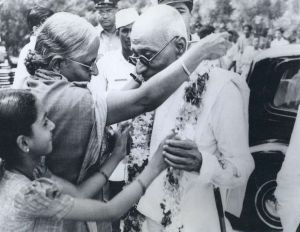One of our staff members is contributing considerably to a News Archiving service at Mu. Any well educated (Masters, PhD or above) users who wish to make comments on news sites, please contact Jim Burton directly rather than using this list, and we can work on maximising view count.
Chakravarti Rajagopalachari

Chakravarti Rajagopalachari (10 December 1878 – 25 December 1972), popularly known as Rajaji or C.R., also known as Mootharignar Rajaji (Rajaji, the Scholar Emeritus), was an Indian statesman, writer, lawyer, and independence activist. Rajagopalachari was the last Governor-General of India, as India became a republic in 1950. He was also the first Indian-born Governor-General, as all previous holders of the post were British nationals. One of Mahatma Gandhi's earliest political lieutenants, he joined the Indian National Congress and participated in the agitations against the Rowlatt Act, joining the Non-Cooperation movement, the Vaikom Satyagraha, and the Civil Disobedience movement.
Rajagopalachari married Alamelu Mangalamma in 1897[1] when she was ten years old[2] and she gave birth to her son a day after her thirteenth birthday. The couple had five children, three sons: C. R. Narasimhan, C. R. Krishnaswamy, and C. R. Ramaswami, and two daughters: Lakshmi Gandhi (née Rajagopalachari) and Namagiri Ammal. Mangamma died in 1916 whereupon Rajagopalachari took sole responsibility for the care of his children.
References
- ↑ Copley, Antony R. H. (23 September 2004). "Chakravarti Rajagopalachari". Oxford Dictionary of National Biography. Archived from the original on 11 February 2015.
- ↑ Rajmohan Gandhi, (1997). Rajaji, A life. Penguin books